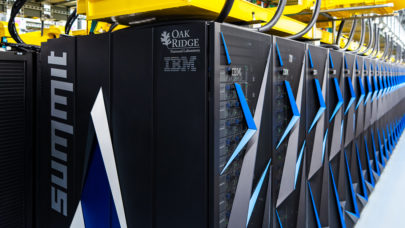
Inside the Gordon Bell Prize Finalist Projects
September 7, 2022
The ACM Gordon Bell Prize, which comes with a $10,000 award courtesy of HPC luminary Gordon Bell, is widely considered the highest prize in high-performance com Read more…

SC22 Unveils ACM Gordon Bell Prize Finalists
August 12, 2022
Courtesy of the schedule for the SC22 conference, we now have our first glimpse at the finalists for this year’s coveted Gordon Bell Prize. The Gordon Bell Pr Read more…

What’s New in HPC Research: Summit, Sunway, ThetaGPU & More
February 15, 2022
In this regular feature, HPCwire highlights newly published research in the high-performance computing community and related domains. From parallel programmin Read more…

Three Chinese Exascale Systems Detailed at SC21: Two Operational and One Delayed
November 24, 2021
Details about two previously rumored Chinese exascale systems came to light during last week’s SC21 proceedings. Asked about these systems during the Top500 media briefing on Monday, Nov. 15, list author and co-founder Jack Dongarra indicated he was aware of some very impressive results, but withheld comment when asked directly if he had... Read more…

2021 Gordon Bell Prize Goes to Exascale-Powered Quantum Supremacy Challenge
November 18, 2021
Today at the hybrid virtual/in-person SC21 conference, the organizers announced the winners of the 2021 ACM Gordon Bell Prize: a team of Chinese researchers leveraging the new exascale Sunway system to simulate quantum circuits. The Gordon Bell Prize, which comes with an award of $10,000 courtesy of HPC pioneer Gordon Bell, is awarded annually... Read more…

What’s New in HPC Research: DPUs, Metagenomics, Sunway & More
October 12, 2021
In this regular feature, HPCwire highlights newly published research in the high-performance computing community and related domains. From parallel programming Read more…

The US Places Seven Additional Chinese Supercomputing Entities on Blacklist
April 8, 2021
As tensions between the U.S. and China continue to simmer, the U.S. government today added seven Chinese supercomputing entities to an economic blacklist. The U Read more…

What’s New in HPC Research: Astra, Cabernet, the Cloud Performance Gap & More
December 8, 2020
In this regular feature, HPCwire highlights newly published research in the high-performance computing community and related domains. From parallel programming Read more…

- Click Here for More Headlines

Whitepaper
Transforming Industrial and Automotive Manufacturing
In this era, expansion in digital infrastructure capacity is inevitable. Parallel to this, climate change consciousness is also rising, making sustainability a mandatory part of the organization’s functioning. As computing workloads such as AI and HPC continue to surge, so does the energy consumption, posing environmental woes. IT departments within organizations have a crucial role in combating this challenge. They can significantly drive sustainable practices by influencing newer technologies and process adoption that aid in mitigating the effects of climate change.
While buying more sustainable IT solutions is an option, partnering with IT solutions providers, such and Lenovo and Intel, who are committed to sustainability and aiding customers in executing sustainability strategies is likely to be more impactful.
Learn how Lenovo and Intel, through their partnership, are strongly positioned to address this need with their innovations driving energy efficiency and environmental stewardship.
Download Now
Sponsored by Lenovo
Whitepaper
How Direct Liquid Cooling Improves Data Center Energy Efficiency
Data centers are experiencing increasing power consumption, space constraints and cooling demands due to the unprecedented computing power required by today’s chips and servers. HVAC cooling systems consume approximately 40% of a data center’s electricity. These systems traditionally use air conditioning, air handling and fans to cool the data center facility and IT equipment, ultimately resulting in high energy consumption and high carbon emissions. Data centers are moving to direct liquid cooled (DLC) systems to improve cooling efficiency thus lowering their PUE, operating expenses (OPEX) and carbon footprint.
This paper describes how CoolIT Systems (CoolIT) meets the need for improved energy efficiency in data centers and includes case studies that show how CoolIT’s DLC solutions improve energy efficiency, increase rack density, lower OPEX, and enable sustainability programs. CoolIT is the global market and innovation leader in scalable DLC solutions for the world’s most demanding computing environments. CoolIT’s end-to-end solutions meet the rising demand in cooling and the rising demand for energy efficiency.
Download Now
Sponsored by CoolIT
Advanced Scale Career Development & Workforce Enhancement Center
Featured Advanced Scale Jobs:
HPCwire Resource Library
HPCwire Product Showcase
© 2024 HPCwire. All Rights Reserved. A Tabor Communications Publication
HPCwire is a registered trademark of Tabor Communications, Inc. Use of this site is governed by our Terms of Use and Privacy Policy.
Reproduction in whole or in part in any form or medium without express written permission of Tabor Communications, Inc. is prohibited.
























